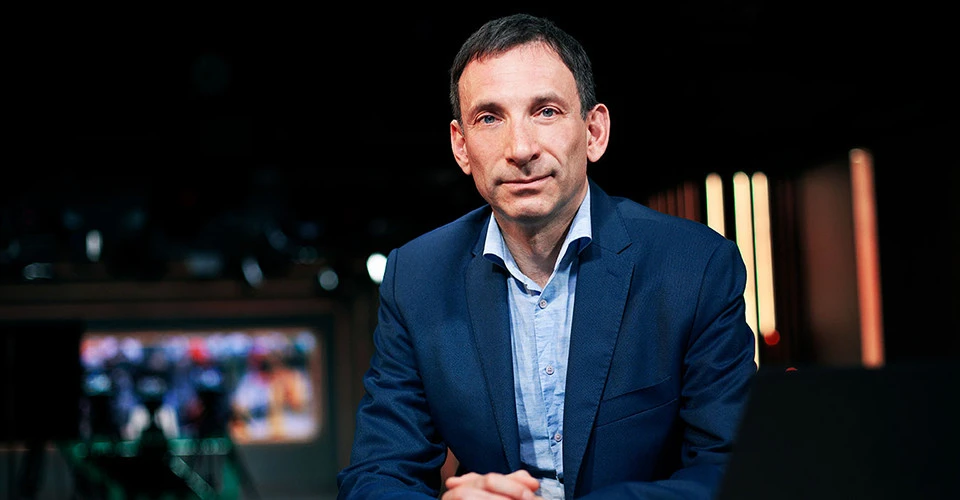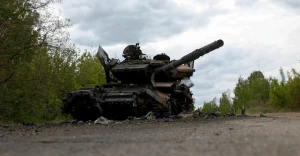
Why Ukrainian officer Chervinsky is accused of Nord Stream sabotage? Vitaly Portnikov's column
The Washington Post has once again brought up the issue of alleged Ukrainian involvement in disrupting the Nord Stream pipelines' infrastructure. This time, Ukrainian spy Roman Chervinsky is named as the person responsible for the operation
Chervinsky denies his involvement in such an operation in a statement to The Washington Post. However, he admits to participating in and leading other high-profile special operations conducted by Ukrainian special services. These operations were primarily aimed at dealing with Ukraine's betrayers, not against civilian infrastructure linked to Europe's energy security. This raises the question of who deems it necessary to accuse Ukraine of organizing such a special operation and whether Ukraine was needed to do it.
Typically, those citing anonymous sources suggest that Kyiv had an interest in the Nord Stream's demise, fearing a loss of income from the transit of Russian gas through its territory. This assertion seems odd because, a month before the Nord Streams' infrastructure was damaged, Russian President Vladimir Putin had authorized Gazprom to significantly reduce gas supply through the Nord Stream-1 pipeline.
It was a clear attempt at blackmail by the Russians. Putin hoped for a favorable response regarding the certification of the Nord Stream-2 gas pipeline. The completion of this pipeline signaled to him that he could potentially make a bold move of invasion, considering the supply of Russian gas to Europe wouldn’t now be at risk even if the Ukrainian gas transportation system suffered damage during conflicts in Ukraine.
Ukraine, on the other hand, has long recognized that the era of Russian gas transit through its territory is ending. It's no surprise that Naftogaz of Ukraine emphasizes they won't extend the transit contract with Russia once it expires. Consequently, Ukraine will miss out on substantial profits from Russian transit, and it is unrelated to the Nord Stream-2. The economic losses due to the war are so significant that they can't be compared to those from the transit loss.
So, Ukraine didn't expect last year that impacting the infrastructure of the Nord Stream would change the country's economic situation. Instead, it was keen on securing financial assistance from the EU and the United States. Without such support, the Ukrainian budget would face severe constraints, a fact well understood in Kyiv. Conversely, Russia was actually interested in disrupting the Nord Stream to demonstrate that Europe could face gas shortages without Russian gas. Gazprom's attempts to freeze Europe during every war season won't cease until the Russian Federation eases its confrontational stance with the West.
The situation is shifting as Russia gains control over gas tanker transportation, posing a significant threat to Europe's energy security. The move is insidious because Russia begins to compete with the United States here, and the pricing policy and energy security of Europe will also depend on its supply to the European market. The undermining of Nord Stream-1 and the damage to Nord Stream-2 suggest the signals from Russian President Vladimir Putin – repercussions if support for Ukraine persists: "If you continue to help Ukrainians, cold and terrible winters are expected for you." It appears the Russian president miscalculated, but his motives still remain unclear.
Another motive is to blame Europe's crucial energy infrastructure in Ukraine, casting doubt on the necessity of aiding the country against Russian aggression. Despite the passage of months since the incident on the Russian gas pipeline to European countries, these attempts persist.
However, other incidents, such as those in Baltic Sea gas pipelines, oil pipelines, and communication systems, seem obviously unrelated to Ukraine. Strangely, Russia still seeks to assign blame to Ukraine, at least at a high official level. Though nobody is rushing to accuse Russia itself, such accusations typically only appear in social media comments.
Another motive of such publication is to highlight a growing perception of discord among Ukraine's military leaders, intelligence services, and political leadership. This theme has gained traction in Ukrainian media, Western press, and Nord Stream-related articles. It suggests persistent differences between Ukraine's military and political heads since the onset of the war, indicating that President Zelenskyy may not have been apprised of impactful operations by his intelligence services. That is, the president allegedly does not have control over the situation when it comes to fundamental issues related to Ukrainian security and relations with allies.
Furthermore, it's important to recognize that even if Ukraine did decide to disrupt Nord Stream-1 and Nord Stream-2, it seems implausible that Zelenskyy, both as the Supreme Commander of the Armed Forces and a key figure in foreign policy, wouldn't be informed. This isn't about a localized military conflict but an attack on shared civil infrastructure involving both Russia and EU countries.
It is impossible not to brief the President of Ukraine on special service operations outside Ukraine, as no institutional mechanism exists for this. However, those crafting such narratives or their sources, whether in Kyiv or elsewhere, aim to portray incompetent and uninformed leadership. They depict a military command capable of not only conflicting with the political leadership but also making decisions without considering the necessity of informing the political leadership.
In simpler terms, if we put it in the language of former Russian President Dmitry Medvedev in his notes about Ukraine, it’s all about a "failed state." A failed state that, for unclear reasons, opposes an un-failed state, and wants to bring order to its territories, like we saw in Bucha or Mariupol. That’s what a Western reader should think after reading such a publication. And of course, it would be most interesting to find out who these anonymous sources are, those who create such a picture of non-existent Ukraine and its leadership that is not capable of any real decisions in the eyes of Western journalists.
Source
About the author. Vitaliy Portnikov, journalist, the Shevchenko National Prize laureate
The editorial board does not always share the opinions expressed by the blog authors.
- News













































